-
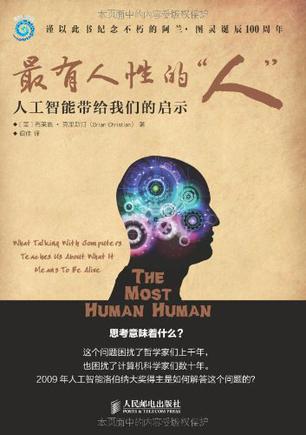
最有人性的“人”
最有人性的"人":人工智能带给我们的启示,ISBN:9787115291073,作者:(美)克里斯汀 著,闾佳 译 -
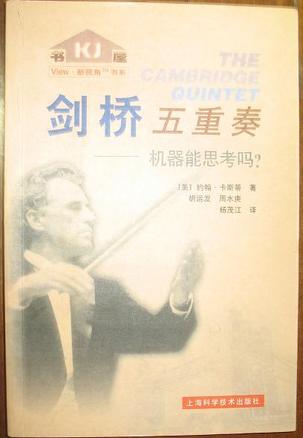
剑桥五重奏——机器能思考吗?
在《剑桥五重奏》一书中,卡斯蒂并没有简单地罗列和堆积半个世纪以来有关思维机器(thinking machine)实验的事实与结果,而是以一个数学家的丰富想象力虚构了一次特别的晚宴。晚宴发生在1949年的春夏之交,地点是剑桥大学基督学院的一间房子——也就是本书主人公之一、晚宴的主人、小说家兼物理学家C.P.斯诺以前在剑桥大学基督学院担任教师时的住所。应邀出席晚宴的有最早提出计算机可以复制人类思维过程的著名数学家阿兰·图灵、语言哲学家路德维格·维特根斯坦和量子物理学家欧文·薛定谔以及遗传学家J.B.S.霍尔丹。即便是以今天的科学与文化眼光来看,这五位仍是世界级的科学和文化名人,甚至是巨人。品尝着美味佳肴,五位思想家围绕着“机器能思考吗”这一论题展开了广泛深入的探讨,洋洋洒洒,畅所欲言,从机器和人脑的结构关系到机器对人类思维的模拟,从机器能否理解其自身的操作语义到为了模拟人类思维机器是否应该具备人类语言,以及机器如何学习语言,还有思维机器的社会性问题,如个性、认同性以及与思维机器相关的文化形态和社会规范等等。言之所及无不令人耳目一新。 -
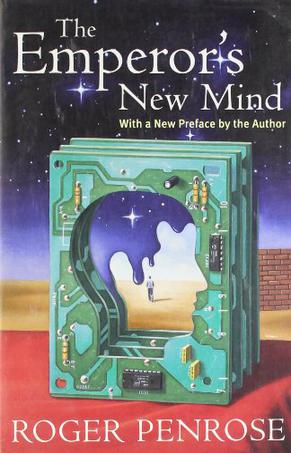
The Emperor's New Mind
In the readition of the bestselling Chaos and A Brief History of Time, here is a science book with mainstream appeal. Proponents of artificial intelligence maintain that eventually a computer will be able to do everything a human mind can do, but Oxford University Professor of Mathematics Roger Penrose explains his view that there are facets of human thinking that can never be emulated by a machine. Drawings throughout. Some love it, some hate it, but The Emperor's New Mind, physicist Roger Penrose's 1989 treatise attacking the foundations of strong artificial intelligence, is crucial for anyone interested in the history of thinking about AI and consciousness. Part survey of modern physics, part exploration of the philosophy of mind, the book is not for casual readers--though it's not overly technical, it rarely pauses to let the reader catch a breath. The overview of relativity and quantum theory, written by a master, is priceless and uncontroversial. The exploration of consciousness and AI, though, is generally considered as resting on shakier ground. Penrose claims that there is an intimate, perhaps unknowable relation between quantum effects and our thinking, and ultimately derives his anti-AI stance from his proposition that some, if not all, of our thinking is non-algorithmic. Of course, these days we believe that there are other avenues to AI than traditional algorithmic programming; while he has been accused of setting up straw robots to knock down, this accusation is unfair. Little was then known about the power of neural networks and behavior-based robotics to simulate (and, some would say, produce) intelligent problem-solving behavior. Whether these tools will lead to strong AI is ultimately a question of belief, not proof, and The Emperor's New Mind offers powerful arguments useful to believer and nonbeliever alike. --Rob Lightner -
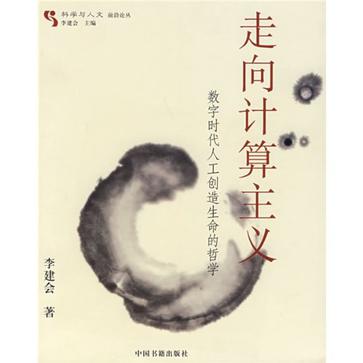
走向计算主义
序言 摘要 Abstract 第一章 导论 一、人工生命研究的兴起和基本思想 二、人工生命提出的生命观和哲学问题 三、人工生命的生命观和哲学研究的价值 四、人工生命的生命观研究的现状及问题 第二章 生命的逻辑与人工生命的思想基础 一、机械过程的本质 二、自我繁殖的逻辑 三、生命游戏与“生命”计算机 四、信息动力学与混沌边缘的生命 第三章 构造人工生命的方法 一、综合的方法 二、从局部到整体 三、遗传算法 四、计算机仿真实验:人工生命和复杂性科学的方法论革命 五、生成和突现 六、一种崭新的思维方式:基于个体的思维 第四章 虚拟人工生命:从磁芯大战到“阿米巴世界” 一、磁芯大战 二、计算机病毒和蠕虫 三、Tierra:人扮演“上帝” 四、“阿米巴世界” 第五章 现实人工生命:从自主Agent到进化机器人 一、经典人工智能研究及其遇到的问题 二、基于行为的自主机器人研究 三、基于神经网络的联结主义研究 四、进化机器人:虚拟和现实的结合 第六章 生命的定义与强人工生命的可能性 一、定义生命的困难 二、“如吾所识的生命” 三、定义生命的两种方法 四、四种“根本性质”定义 五、强人工生命的可能性 第七章 强人工生命的本体论地位 一、虚拟的真实性 二、人工生命实在性的理论论证 三、哥德尔定理与强人工生命 第八章 走向计算主义 一、信息、算法和计算:理解生命本质的重要概念 二、计算的本质 三、认知与计算 四、生命与计算 五、宇宙与计算 六、对一些反对意见的反驳 七、结语 参考文献 中英文人名译名对照表 致谢 -
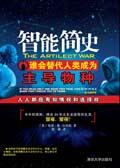
智能简史
不远的将来,人工智能机器的智能将是人类的万亿个万亿倍,它们面对我们,并不像我们面对狗,而是如同我们面对蚊子、跳蚤甚至岩石,当它们消灭我们的时候,如同我们将蚊子拍死,将臭虫冲进下水道,谁会在消灭跳蚤的时候觉得这样太残忍了呢?!这也许是人类逃脱不了的宿命,这也使德·加里斯教授认为有责任写这本书。我知道如果不让地球上每个人都对这个关乎人类存亡的问题知情并且思考,那么书中所描写的比所有科幻电影更刺激、可怕的事情很有可能发生,甚至更加糟糕。希望每个人都来关注,希望每个人都来思考,希望这一切都还来得及…… -
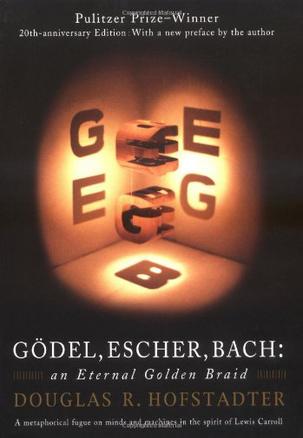
Gödel, Escher, Bach
Twenty years after it topped the bestseller charts, Douglas R. Hofstadter's Gödel, Escher, Bach: An Eternal Golden Braid is still something of a marvel. Besides being a profound and entertaining meditation on human thought and creativity, this book looks at the surprising points of contact between the music of Bach, the artwork of Escher, and the mathematics of Gödel. It also looks at the prospects for computers and artificial intelligence (AI) for mimicking human thought. For the general reader and the computer techie alike, this book still sets a standard for thinking about the future of computers and their relation to the way we think. Topics Covered: J.S. Bach, M.C. Escher, Kurt Gödel: biographical information and work, artificial intelligence (AI) history and theories, strange loops and tangled hierarchies, formal and informal systems, number theory, form in mathematics, figure and ground, consistency, completeness, Euclidean and non-Euclidean geometry, recursive structures, theories of meaning, propositional calculus, typographical number theory, Zen and mathematics, levels of description and computers; theory of mind: neurons, minds and thoughts; undecidability; self-reference and self-representation; Turing test for machine intelligence.